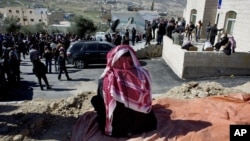The fight between the extremist group Islamic State, and the Western/Arab coalition battling to defeat it has become a public showdown of horror. And analysts warn there could be more to come.
"As soon as we get to the point where we think they can’t get any worse than they are, they manage to exceed the brutality of even what we have become accustomed to," said Mia Bloom, a professor of security studies at University of Massachusetts.
"It’s not that we are immune to the violence, it’s just that they are pushing the envelope and engaging in more and more violence," Bloom told VOA.
Images of a young Jordanian pilot being burned alive in a cage by Islamic State militants shocked and horrified people around the world this week. Crowds took to the streets in Jordan demanding that Muath al-Kaseasbeh’s death at the hands of Islamic State extremists be avenged.
IS militants executed
The next day, Jordan executed two Islamic State militants it had in custody, including female suicide bomber Sajida al-Rishawi. The result, Bloom and other experts said, will be a further increase in brutality.
"My worry is now that they will take an eye-for-an-eye attitude, and will say, 'Well, Sajida was killed so we are going to kill these two women that we have,' and that would then ratchet up the violence to the next level," Bloom said.
The Islamic State group is believed to be holding an American female aid worker and three Red Cross workers, including a woman.
A U.S. official, speaking to VOA on condition of anonymity, said the highly produced video of the Jordanian pilot’s killing and videos of other Islamic State violence are being used by the extremist group to rally their core audience.
"The videos do embolden a very base set of followers," the official said, adding that to the minds of Islamic State militants, they show the group’s strength.
According to Yonah Alexander, director of the International Center for Terrorism Studies at the Potomac Institute, the Islamic State group’s use of brutality and propaganda is a two-pronged effort to keep themselves on an international stage where they cannot win militarily.
"You are talking about terrorism as a great equalizer, which means you kill one, you don’t need missiles," Alexander told VOA. "Their aim is to able to be equal to ... a superpower like the United States."
'Worst is yet to come'
Alexander said that he expects much more violence.
"I personally believe the worst is yet to come," he said. "There is going to be more kidnapping. There is going to be hijacking. There is going to be more killing."
According to an analysis published by the Soufan Intelligence Group, the Islamic State group "needs a constant fight to stay relevant." As such, they keep trying through spectacular acts of violence to goad the international community to overreact.
But Bloom, who has written on the psychology of terrorism, said the Islamic State group’s use of extreme violence could backfire, turning local populations against the group.
The brutality has already outraged many Muslim nations, including Jordan.
Yet the killing of the Jordanian pilot, who was flying over Syria as part of a U.S.-led coalition of countries conducting airstrikes against the Islamic State extremists, has clearly shaken some nations. The United Arab Emirates on Wednesday announced it was ending its participation in the military effort.
But far from stepping back, Jordan's King Abdullah said Jordan will now be "relentless" in the war against Islamic State.
VOA's Jeff Seldin contributed to this report.





